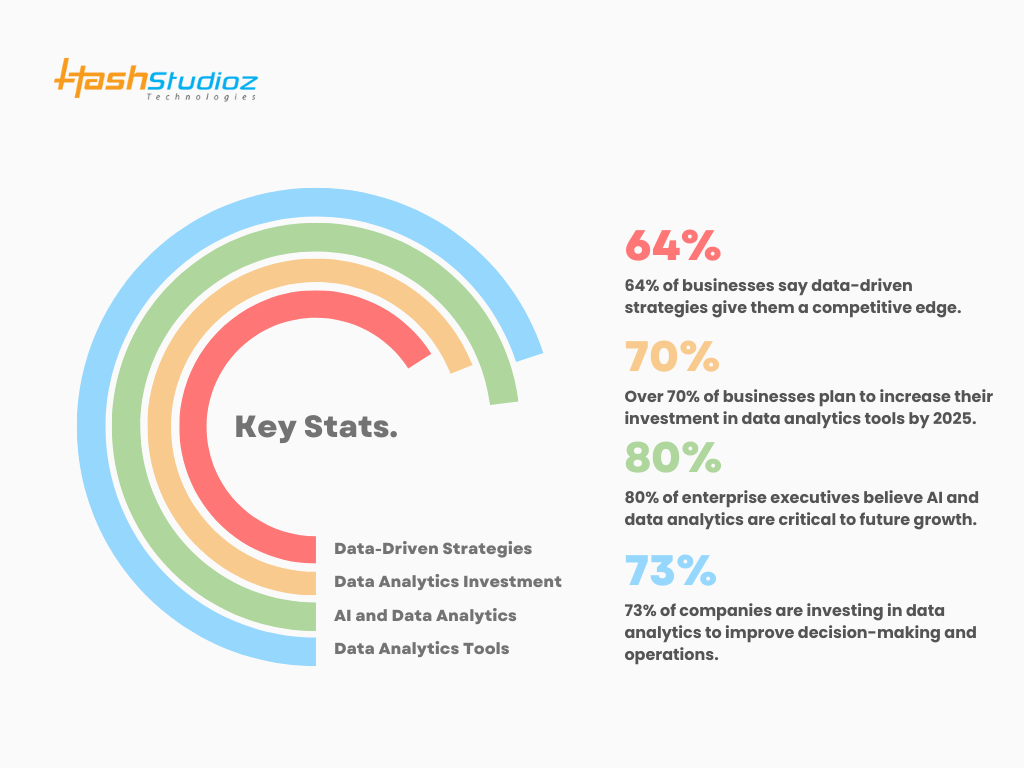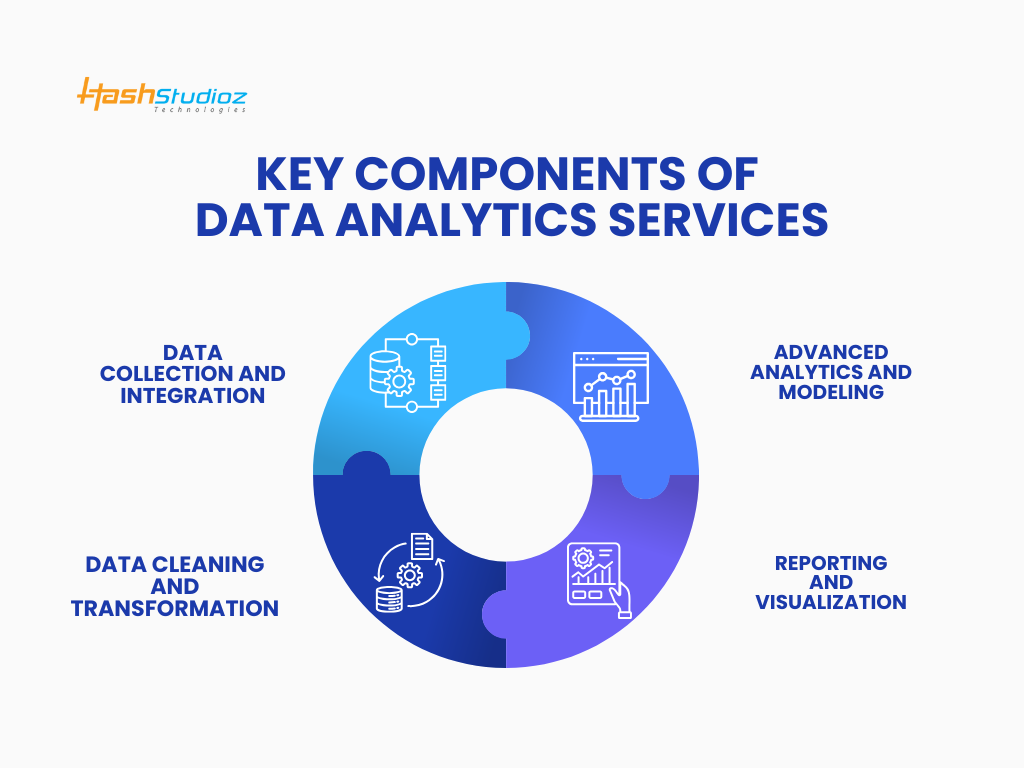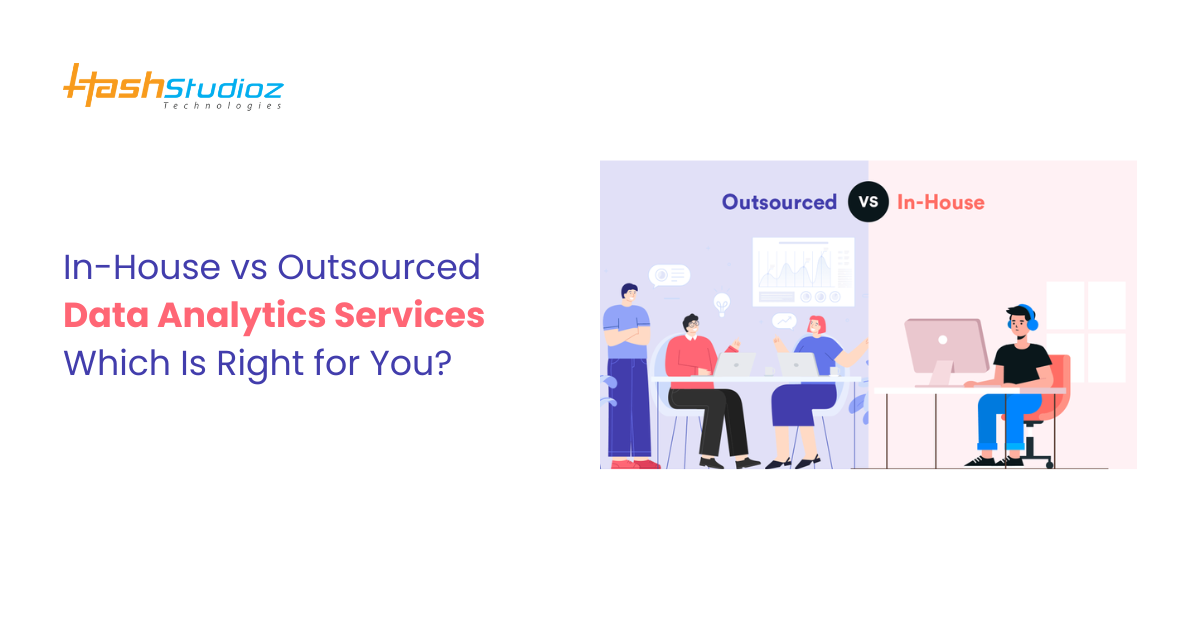In today’s data-driven world, businesses rely heavily on data analytics services to gain insights, improve decision-making, and drive growth. Whether you’re a startup or a multinational corporation, investing in data analytics can offer transformative benefits. However, the big question often remains—should you establish an in-house data analytics team or outsource data analytics services?
This article aims to provide a detailed comparison of both approaches to help you decide the right fit for your business needs. It will also cover key statistics, FAQs, and tips for selecting the right data analytics services company.
- 64% of businesses say data-driven strategies give them a competitive edge.
- 73% of companies are investing in data analytics to improve decision-making and operations.
- 80% of enterprise executives believe AI and data analytics are critical to future growth.
- Over 70% of businesses plan to increase their investment in data analytics tools by 2025.

Table of Contents
Understanding Data Analytics Services
Data Analytics Services encompass a structured approach to collecting, processing, and analyzing data to extract actionable insights. These services empower businesses to uncover patterns, predict trends, and make informed decisions, driving growth and efficiency.
Key Components of Data Analytics Services
- Data Collection and Integration:
- Gathering raw data from multiple sources such as databases, CRM systems, social media, and IoT devices.
- Integrating data into a centralized repository for streamlined analysis.
- Data Cleaning and Transformation:
- Identifying and correcting errors to ensure data accuracy and reliability.
- Standardizing formats and structures to prepare data for analysis.
- Advanced Analytics and Modeling:
- Applying statistical models, machine learning algorithms, and predictive analytics to uncover insights.
- Analyzing patterns for forecasting trends and optimizing operations.
- Reporting and Visualization:
- Presenting findings through interactive dashboards, graphs, and visual reports.
- Enabling stakeholders to understand data easily and make data-driven decisions.

Why Are Data Analytics Services Important?
- Improved Decision-Making: Data-driven insights reduce guesswork and promote strategic planning.
- Enhanced Efficiency: Identifies inefficiencies and optimizes processes.
- Market Competitiveness: Helps businesses adapt to trends and gain a competitive edge.
- Risk Management: Predicts risks and formulates mitigation strategies.
By leveraging Data Analytics Services, businesses can transform raw data into meaningful intelligence, leading to sustainable growth and better performance.
In-House Data Analytics Services
In-house data analytics services involve creating and managing an internal team of data analysts, data scientists, and IT professionals within an organization. This approach requires building the necessary infrastructure, procuring software tools, and ensuring ongoing maintenance and training. It offers organizations complete control over their data and analytics processes but comes with significant costs and resource commitments.
Pros of In-House Data Analytics Services
- Complete Control:
- Full ownership of data management and analysis processes.
- Ensures compliance with organizational security policies and regulatory standards.
- Tailored Solutions:
- Analytics tools and workflows can be customized to address specific business goals.
- Flexibility to align strategies with internal operations and evolving needs.
- Rapid Iterations:
- Quicker feedback and adaptation cycles for project developments.
- Seamless collaboration with other departments for immediate implementation.
- Alignment with Company Goals:
- Dedicated teams have a deeper understanding of the organization’s objectives, culture, and strategies.
- Better coordination across departments leads to improved efficiency and performance.
Cons of In-House Data Analytics Services
- High Initial Investment:
- Requires significant spending on hiring skilled data analysts, procuring software, and establishing infrastructure.
- Budget-intensive for small to mid-sized companies.
- Limited Expertise:
- In-house teams may lack advanced specialization in emerging analytics technologies and methodologies.
- Difficulties in keeping up with rapid innovations without external support.
- Resource-Intensive Maintenance:
- Continuous updates, training, and troubleshooting demand ongoing time and monetary investment.
- Managing technical upgrades and compliance checks adds operational complexity.
- Scalability Challenges:
- Expanding teams or capabilities to meet growing demands is often time-consuming and expensive.
- Limited flexibility to quickly scale operations during peak periods.
Outsourced Data Analytics Services
Outsourced Data Analytics Services involve delegating data collection, processing, and analysis tasks to a third-party Data Analytics Services Company. This approach enables businesses to leverage specialized expertise, cutting-edge tools, and advanced technologies without the need for heavy investments in infrastructure or full-time staff.
Pros of Outsourced Data Analytics Services
- Cost-Effective Solutions
- Avoids expenses related to hiring, training, and maintaining an in-house analytics team.
- Reduces infrastructure and software costs, as tools are provided by the service provider.
- Access to Expertise
- Leverages the experience of skilled data analysts and consultants.
- Utilizes state-of-the-art technologies and methodologies without upfront investments.
- Scalability and Flexibility
- Easily scale up or down based on changing business needs and project demands.
- Suitable for short-term projects or fluctuating workloads.
- Faster Deployment
- Speeds up implementation timelines as service providers already have established frameworks and processes.
- Eliminates delays caused by recruitment and setup.
- Focus on Core Business
- Frees up internal teams to prioritize strategic goals and customer engagement.
- Delegates complex analytics tasks to experts, ensuring high-quality outcomes.
Cons of Outsourced Data Analytics Services
- Limited Control
- Businesses may have less oversight and control over the data handling process.
- Dependence on external teams can lead to misalignment with internal objectives.
- Data Security Risks
- Sharing sensitive data with third-party vendors may expose businesses to privacy and compliance risks.
- Requires strict agreements and security measures to protect confidential information.
- Communication Barriers
- Time zone differences and language gaps can hinder seamless collaboration.
- May lead to delays or misunderstandings in project execution.
Key Considerations for Choosing Between In-House and Outsourced Data Analytics Services
Making the right choice between in-house and outsourced data analytics services involves evaluating several critical factors. Below is a detailed breakdown of the key considerations:
1. Budget Constraints
Budget plays a crucial role in deciding whether to build an in-house team or outsource analytics services.
- In-House Analytics: Requires significant upfront investment in hiring, training, software, hardware, and infrastructure. Long-term operational costs may also be higher due to ongoing maintenance and employee salaries.
- Outsourced Analytics: Provides a cost-effective solution with flexible pricing models (hourly, project-based, or subscription). Businesses can avoid large initial investments and instead pay for services as needed.
2. Project Complexity
Assess the scope and complexity of your analytics needs.
- In-House Analytics: Suitable for businesses requiring customized solutions, long-term strategies, and continuous analytics operations.
- Outsourced Analytics: Ideal for specialized projects, short-term requirements, or businesses needing advanced tools and expertise that may not be available internally.
3. Scalability Requirements
Data analytics needs often evolve as businesses grow.
- In-House Analytics: Scaling up requires additional investments in staff, tools, and training, which may slow down growth.
- Outsourced Analytics: Offers greater flexibility to scale services up or down quickly without the need for new hires or infrastructure upgrades.
4. Time Sensitivity
The timeline for implementing data analytics solutions can affect your decision.
- In-House Analytics: Building a team and setting up processes take time, making it better suited for long-term projects.
- Outsourced Analytics: Provides faster deployment since providers have ready-to-use tools and experienced professionals, making it ideal for urgent projects.
5. Data Sensitivity
The importance of data privacy and security cannot be overstated, especially for industries like finance, healthcare, and legal services.
- In-House Analytics: Ensures complete control over sensitive data, reducing the risk of breaches.
- Outsourced Analytics: Requires stringent contracts, compliance checks, and data security protocols to protect confidential information.
Comparative Analysis: In-House vs Outsourced Data Analytics Services
| Criteria | In-House Services | Outsourced Services |
| Cost | High initial investment due to hiring, training, and infrastructure setup. | Lower upfront costs as outsourcing eliminates the need for internal hiring and resources. |
| Expertise | Limited to the internal team’s skills and knowledge base. | Access to a wide range of specialized expertise and industry knowledge from external providers. |
| Scalability | Slower expansion, requiring more internal resources to scale. | Flexible and scalable; outsourcing allows for quick adjustments to growing business needs. |
| Control | Full control over data processes, security, and implementation. | Limited oversight as data management and decisions are handled externally. |
| Implementation Speed | Slower setup time as internal teams must be hired and trained. | Faster deployment due to the availability of pre-existing resources and experienced teams. |
| Maintenance | Continuous internal management, including updates and troubleshooting. | Managed externally, with the service provider handling maintenance and support. |
How to Make the Final Decision
1. Assess Current Needs: Evaluate whether your data analytics requirements are continuous or limited to specific projects. Ongoing needs may justify building an in-house team, while project-based tasks might be better suited for outsourcing.
2. Calculate ROI: Analyze the long-term return on investment (ROI) of both approaches. Consider initial costs, long-term expenses, and the potential benefits each option offers in terms of speed, scalability, and expertise.
3. Consult Experts: To ensure an informed decision, hire a data analyst or consult a Data Analytics Services Company. Experts can help assess your business’s unique requirements and guide you in choosing the most suitable solution.
4. Run Pilot Tests: Before fully committing, run small-scale pilot tests with an outsourced Data Analytics Solution. This will help you evaluate the service quality, efficiency, and whether it meets your needs before making a final decision.
Why Choose HashStudioz?
HashStudioz is a trusted Data Analytics Services Company offering comprehensive, end-to-end solutions designed to transform your business through data. With expertise spanning data integration, modeling, and visualization, HashStudioz delivers scalable, cost-effective analytics solutions that help organizations make informed, data-driven decisions.
How HashStudioz Can Help You
- Custom Analytics Solutions: Tailored to meet your business needs.
- Expert Data Analysts: Certified professionals with deep industry knowledge.
- Scalable Infrastructure: Easily adapt to your growing data requirements.
- Secure and Compliant: Robust data governance policies for data security.
- 24/7 Support: Continuous monitoring and assistance for uninterrupted performance.

Conclusion
Choosing between in-house and outsourced data analytics depends on your budget, expertise, and long-term goals. In-house offers control and customization but can be costly and resource-intensive. Outsourcing provides cost-efficiency, scalability, and access to specialized expertise. Evaluate your needs and resources to make the best decision for your business.
FAQs
Q1: What are data analytics services?
Data analytics services involve processes and tools used to analyze data for insights and decision-making.
Q2: When should I hire data analysts?
Hire data analysts when you need continuous, in-depth data analysis or want to build a long-term analytics strategy.
Q3: Is outsourcing data analytics services secure?
Yes, reputable data analytics services companies follow strict security protocols to protect your data.
Q4: How do I choose between in-house and outsourced solutions?
Consider factors like budget, scalability, control, and expertise requirements before deciding.
Q5: What industries benefit most from data analytics solutions?
Industries like retail, healthcare, finance, and manufacturing benefit significantly from data analytics solutions.

